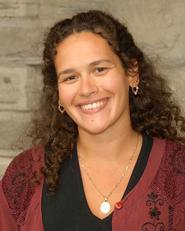
Assistant Professor of Comparative Literature Anjela Peck presented a paper titled "The Libros plúmbeos and the Divine Feminine: Mary, Alchemy and the Magical Star of Solomon" at an International Conference on Conversos and Moriscos in Segovia, Spain, in June.
The conference brought together a select group of historians, literary scholars as well as art historians from the U.S, Canada, Israel, Spain, France and England to discuss 15th and 16th century Iberian and Mediterranean politics from the view point of conversos and moriscos. These two groups, Jews and Christians, were forcibly converted to Christianity under the auspices of the Holy Office of the Inquisition. Peck's paper looked at the apocryphal "Leaden Texts" of Granada through the filter of alchemy.
Peck also attended a National Endowment for the Humanities Summer Institute in Barcelona, Spain during the month of July. Titled "Origins of the "The Medieval Mediterranean and the Origins of the West," this four-week program was for college faculty who study the Middle Ages through the lens of the Mediterranean. It was limited to 24 college faculty members.
The goal of the NEH Institute was to facilitate a collaborative reconceptualization of the "Dark Ages" (1000-1500) through study of the Mediterranean. As such, the program combined lectures, colloquia, workshops and interdisciplinary research on four thematic units: Contact and Diffusion, Mediterranean Spaces, Relations and Transmission as well as Images and Substance.
The conference brought together a select group of historians, literary scholars as well as art historians from the U.S, Canada, Israel, Spain, France and England to discuss 15th and 16th century Iberian and Mediterranean politics from the view point of conversos and moriscos. These two groups, Jews and Christians, were forcibly converted to Christianity under the auspices of the Holy Office of the Inquisition. Peck's paper looked at the apocryphal "Leaden Texts" of Granada through the filter of alchemy.
Peck also attended a National Endowment for the Humanities Summer Institute in Barcelona, Spain during the month of July. Titled "Origins of the "The Medieval Mediterranean and the Origins of the West," this four-week program was for college faculty who study the Middle Ages through the lens of the Mediterranean. It was limited to 24 college faculty members.
The goal of the NEH Institute was to facilitate a collaborative reconceptualization of the "Dark Ages" (1000-1500) through study of the Mediterranean. As such, the program combined lectures, colloquia, workshops and interdisciplinary research on four thematic units: Contact and Diffusion, Mediterranean Spaces, Relations and Transmission as well as Images and Substance.
Posted August 22, 2008
